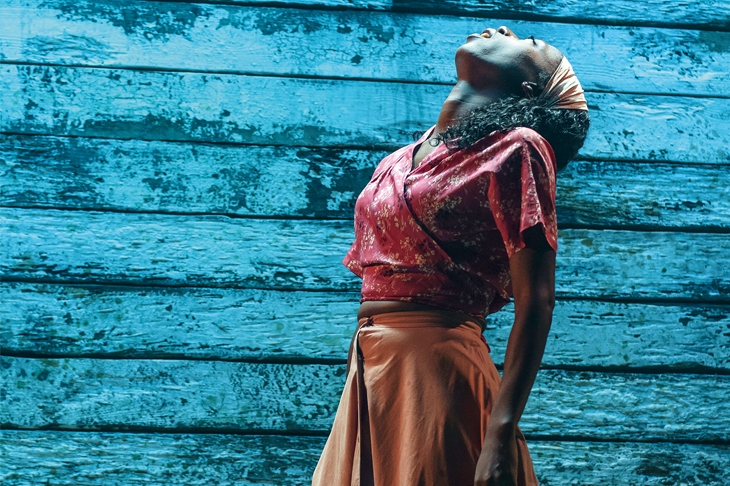Bang! A brand new theatre has opened on the South Bank managed by the two Nicks, Hytner and Starr, who ran the National for more than a decade. Located near a river crossing, their venture bears the unexciting name ‘Bridge’. If these two adopted a child, they’d call it ‘Orphanage’. Visitors approach along the Thames embankment and arrive at a soaring cliff of glass whose revolving doors usher them into a large anonymous foyer. It feels like a student union bar or a bit of an airport. Dangling from the ceiling are dozens of light bulbs, their radiance muted with tea-stained shades that cast an absolving glow over facelifts, hairpieces and liver spots.
The performing area is a sort of Dorfman replica with the stalls expanded laterally to twice the size of the original. The 900 seats, made of leather and cloth, are comfortable and non-squeaky. Look down and you’ll see black lino speckled with Pollock-y blotches that might have been reclaimed from a Jobcentre. The inaugural show is a comic biography of Karl Marx written by Richard Bean and someone else. Up go the lights. A fat square block is revealed representing the blackened tenements of London in 1850. Marx and his young family are living in a Soho garret haunted by debt-collectors, police constables and crazy anarchists plotting to murder Queen Victoria.
This amiable show portrays the German revolutionary as a bumbling sweetie, a shambolic, debt-ridden sponger, fond of beer, cigars, and fornicating with the lower orders. When he impregnates his maid, he persuades his best friend Engels to claim responsibility in the hope of neutralising his wife’s suspicions. Nancy Carroll (under-used) is good fun as Marx’s irascible missus. Oliver Chris makes a dashing, hilarious and strangely athletic Engels. The title role is taken by Rory Kinnear, who is widely recognised as Nicholas Hytner’s first choice for any male role not accepted by Simon Russell Beale.
Kinnear pays homage to the director’s favourite thesp with a performance eerily reminiscent of Russell Beale’s mannerisms and vocal tics. The jokes are good, if sparsely scattered. When bailiffs burst into the kitchen, Mrs Marx greets them hospitably. ‘Take a seat.’ They seize a dining-room chair and remove it from the house. Marx’s bottom is visited by a rash of unexploded boils that compel him to work standing up in the British Museum reading room. ‘They think he’s an exhibit,’ quips someone. Elsewhere there are slapstick-y bits, melodramatic bits, snatches of political analysis and a sad twist at the end involving a sudden death and a weepy funeral.
The mishmash works well enough and the BBC could easily turn this material into a historical sitcom like Up the Women or Upstart Crow. And that’s the level: lower-middle brow. Which is rather puzzling. Any commercial venture needs a big marketing campaign and the easiest way to advertise a new theatre is to mount a show that goes on its travels. This lightweight script lacks the sparkle and oomph to cross the Atlantic. And the cast aren’t starry enough to carry a New York opening. Yet it’s hard to imagine the play completing a tour of England’s spa towns and cathedral cities. A cast of eight is too cumbersome for a peripatetic show. This has a company of 17, not including chaperones and understudies for the child actors. The two Nicks are aware of all this, of course, so their decision to launch the theatre with a sparkler rather than a sky rocket must be deliberate. I wonder why.
Kwame Kwei-Armah returns from America to take over the Young Vic next year and he offers us an amuse-bouche with Ibsen’s The Lady from the Sea. Many of the great Nordic gloomster’s favourite motifs are here: a widowed doctor, a deluded artist, a dead child and a rebellious young woman keen to assert her identity in a male-dominated world. The setting is a coastal town where dull Dr Wangel is struggling to save his marriage to Ellida following the death of their first-born. A crazed castaway crashes into town. He once was a mutineer who murdered his skipper and had a wild fling with Ellida. Now he claims her back. She’s still smitten by his bad-boy allure but will she forfeit her boring marriage and take off into the surf with this swaggering sea-lord?
The story sounds like absolute hokum. And it is. But Ibsen’s deft handling of dramatic uncertainties and his fascination with human beings and their frailties make this a compelling drama. Kwei-Armah updates the action to a nameless Caribbean island in the 1950s. And, for once, the chronological transplant works. This is exactly the kind of repressive society Ibsen set out to mock and reform. And the costumes are far freer and more glamorous than the Victorians would have dared to imagine. One to savour.







Comments